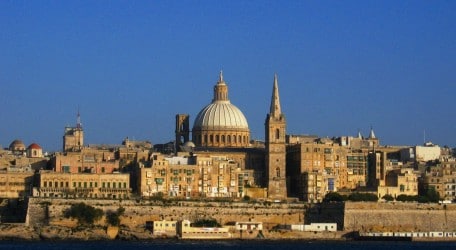
Valletta applies for European Cultural Capital status
The city of Valletta, with the support of all localities
in Malta and Gozo, this week officially applied to be
a European Capital of Culture (ECoC) in 2018. The city’s
candidacy was presented this afternoon byValletta
Mayor Alexiei Dingli to the Parliamentary Secretariat for
Tourism, Culture and the Environment, acting as Managing
Authority, as appointed by the European Commission.
The ECoC is a high profile initiative which gives a
city the chance to bring together and generate novel
expressions of culture, creativity and innovation both
from within its home country and abroad. It provides
the catalyst for the development and flourishing of
high-quality artistic and cultural events and genres.
Most former European Capitals of Culture gained long-term
benefits from the year including economic activity related
to the arts and culture, tourism, and local businesses.
Alexiei Dingli said that ECoC provided an exceptional
opportunity for the long-term development of the Maltese
urban cores, not only in terms of culture but also in terms
of tourism and socio-economic development. Critical
to the success of any ECoC is its ability to provide not
only a vast cultural programme of exceptional events
but also to demonstrate it can drive sustainable, long-term
cultural and social development of the city.
Michael Cohen, President of the Local Councils Association
which co-founded the Foundation together with the
Valletta Local Council, noted that the candidature of
Vallettafor the title of European Capital of Culture is a
lifetime opportunity to promote our capital in the European
and international cultural scene and to create a better life
for its citizens, its businesses and its international visitors.
Valletta’s application, or ‘bid book’, as it is commonly
referred to among Capitals, is the first step in a near
year-long adjudication of the quality, scope and merits
ofValletta’s application. The bid must meet stringent
criteria and undergo the scrutiny of an evaluation
panel approved by the European Commission – once
in January 2012, and for a second time in September –
before the outcome of the application is made public.
The Valletta bid, known by its working title of V18, has
been two years in the making, driven behind the scenes
first by an Inter-ministerial Commission and more
recently by a new entity, the Valletta 2018 Foundation,
itself formally established today. Its founders, theValletta
Local Council and the Local Councils Association are
joined by four other governors on the board: these
are theUniversityofMalta; the Malta Council for
Culture and the Arts; theMaltaChamber of Commerce,
Enterpriseand Industry; and the Inter-Ministerial
Commission for the European Capital of Culture.
The Foundation’s remit is to champion V18 from bid to
a successful legacy of the year well beyond 2018 and to
provide sound organisational and governance structures
which are seen as a vital element of any successful ECoC.
“For the past two years we have worked on the
establishment of good governance – in the form of the
Valletta 2018 Foundation – to guarantee the delivery of an
excellent bid for the title of European Capital of Culture.
V18 is running a full year ahead of the schedule typically
followed by candidate cities and this is to our great
advantage,” said David Felice, Chair of the Foundation.
“We can now shift immediately into developing an
inclusive project through a creative, innovative and
dynamic cultural programme. This will emerge from a
vision that calls for the creation of An Environment of
Exchange, a theme that is constant throughout the history
ofVallettaand common to all Mediterranean cities, but
particularly ofValletta. It is also one that poses a new
cultural, social and economic challenge, since giving
Vallettaa present is to give it a future,” David Felice said.
The Foundation has been working hard engaging the
public and cultural stakeholders, creating awareness and
platforms for dialogue, including through its June ‘Imagine
18’ public workshops and conference which saw key input
into the now eight themes setting the scene of V18.
Karsten Xuereb, Project Coordinator, said the themes
represented the more tangible and visible aspects of the
bid: “They include, for example, Children of the Future,
which seeks to foster dialogue and participation with 2018’s
teenagers and young adults. Our aim is to allow V18 to leave
a lasting legacy that gives tomorrow’s children the right
tools to be able to flourish creatively and professionally.”
“Underpinning the themes, we have clear objectives such
as sustaining a creative economy and encouraging the
dynamic flourishing of diversity. The V18 objectives follow
very closely those of the National Cultural Policy that came
out in July. Through the bid we aim to act as a catalyst for
the implementation of the Cultural Policy. In this way,
V18 is doubly strong as it focuses resources and minds
on the same goals, and sees our submission bolstered by
a nationally-endorsed set of objectives,” Karsten Xuereb
explained.
“We see the bid document presented today as a
sound structure, one that will ensure the programmes, the
events of the year itself and leave us a legacy to work on.”
- October 17, 2011 No comments Posted in: Press Launches





